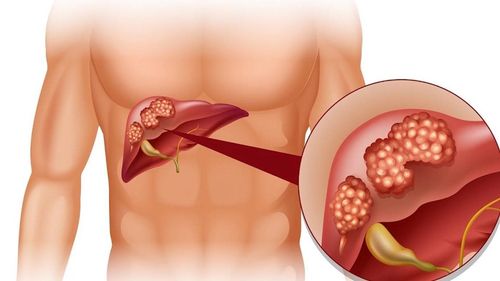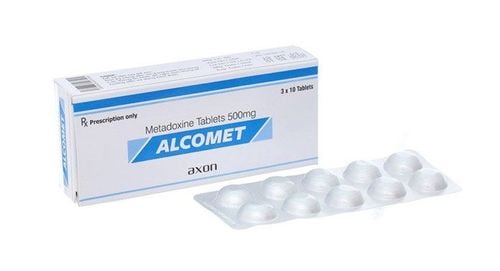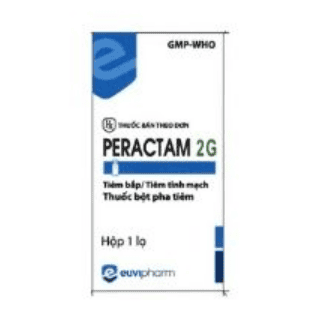This is an automatically translated article.
Alcobuse is a drug indicated for alcohol withdrawal, treatment of alcoholism. This drug causes users to experience unpleasant sensations and symptoms when drinking alcohol, but does not cause harm to the body. Thereby creating conditions for the mind and body to develop an aversion to alcohol.
1. Uses of Alcobuse
In our body, there is an enzyme involved in the metabolism of alcohol, breaking down alcohol, thereby helping to reduce the side effects of drinking such as: heart palpitations, chest pain, nausea, dizziness. , flushed and thirsty.Alcobuse is an alcohol withdrawal drug containing the main active ingredient is Disulfiram 500mg, with the mechanism of inhibiting the above enzyme. So in drug users, when they drink alcohol, the unpleasant symptoms are not relieved. Thereby making drug users gradually have feelings of fear and aversion to alcohol, supporting the process of alcohol withdrawal in people with chronic alcoholism.
2. Usage and dosage of Alcobuse drug.
In the initial phase of treatment, use Alcobuse at a maximum dose of 500 mg/day for 1-2 weeks. Then use a maintenance dose of 125 - 500 mg, depending on the tolerability of unwanted effects. If the person using the drug does not experience a sedative effect when taking it, the daily dose should be taken in the morning, the time when the determination not to drink alcohol is highest. If you experience drowsiness after taking the drug, you can take the daily dose in the evening.
Continue to take Alcobuse continuously daily until the basis for long-term self-restraint is established. Treatment is required on a monthly or yearly basis.
In case of an overdose: In case of an emergency, immediately call the Emergency Center or go to the nearest local Health station.
When you miss a dose: Usually, you can take Alcobuse about 1-2 hours longer than prescribed in the prescription. Therefore, unless there are strict regulations on the time of use, the medicine can be taken a few hours after forgetting. However, if the time is too far from the time you need to take it, you should not make up for it, because it can cause an overdose, which is dangerous for the body. If necessary, consult your doctor before making a decision.
3. Contraindications of the drug Alcobuse.
Do not use Alcobuse in people who:
Have a history of alcohol poisoning, severe heart disease, blocked heart arteries, or have a mental disorder. Hypersensitivity to Disulfiram or other thiuram derivatives, such as those used as insecticides or drugs for the vulcanization of rubber. before taking Alcobuse.
4. Notes when using Alcobuse
Only use Alcobuse when prescribed by a doctor, do not use it arbitrarily, otherwise it will be very dangerous for users.
Do not take Alcobuse if you have consumed alcohol or any other alcoholic beverage within the previous 12 hours. Do not drink alcohol while taking this medication and for a minimum of 14 days after stopping this medication.
Alcobuse users should also avoid cough syrups, sauces, vinegars, sweet wines and other preparations containing alcohol. Topical products such as lotions, cleansers, even perfumes and cosmetics that contain alcohol can also be enough to cause a disulfiram-alcohol reaction.
Disulfiram - alcohol reactions can occur many weeks after disulfiram has been discontinued. Alcobuse users must be fully informed of the risks of Disulfiram therapy, and educate their families about the risks of a Disulfiram-alcohol reaction.
Alcobuse should not be used to treat acute alcohol poisoning in patients.
Tell your doctor if the person using Alcobuse has a history of liver or kidney disease, heart disease, high blood pressure, a history of heart attack or stroke, low thyroid, diabetes, seizures or epilepsy, trauma head or brain damage...
There are currently no studies to determine whether Alcobuse is harmful to pregnant women, nursing women and unborn babies. However, tell your doctor if you are pregnant, plan to become pregnant or are breast-feeding.
5. Side effects of the drug Alcobuse
Get emergency medical help if Alcobuse users have any of the following signs of an allergic reaction to Disulfiram: hives, difficulty breathing; swelling of the face, lips, tongue, or throat. In addition, common side effects of Alcobuse may include skin rash, acne, mild headache, feeling tired, impotence, loss of interest in sex, metallic or garlic-like taste in mouth.
When using Alcobuse, even small amounts of alcohol or alcohol can produce unpleasant symptoms such as:
Flushing of the face and body (heat, redness or tingling sensation). Sweating, increased thirst. Swelling, rapid weight gain. Nausea, severe vomiting. Neck pain, headache, blurred vision. Shortness of breath, chest pain even with mild exertion. Fast heart beat. Weakness, confusion, feeling dizzy, unsteady. Or a feeling of lightness, like maybe fainting. More serious symptoms that may occur when drinking large amounts of alcohol while taking Alcobuse :
Severe chest pain, which may spread to the jaw or shoulder. Slow heart rate, weak pulse. Convulsions, fainting Weak breathing, shallow breathing, or slow breathing (breathing may stop). May cause death. Get medical help right away if you have symptoms such as eye pain or sudden loss of vision, numbness or tingling, confusion, unusual thoughts or behavior, or signs of liver problems including: nausea, upper abdominal pain, itching, tired feeling, loss of appetite, yellowing of the skin or eyes, dark urine, clay-colored stools. Alcobuse (Disulfiram 500 mg) is commonly used to support alcohol withdrawal for chronic alcoholics. Medicines should be taken exactly as prescribed by the doctor. When experiencing any unusual symptoms during the course of taking the drug, it is necessary to contact emergency medical attention for timely support.
Please dial HOTLINE for more information or register for an appointment HERE. Download MyVinmec app to make appointments faster and to manage your bookings easily.













